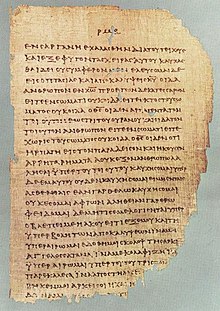2. List do Koryntian
Drugi List do Koryntian [2 Kor] – jeden z listów apostoła Pawła, znajdujący się w Nowym Testamencie.
Napisany wspólnie z Tymoteuszem podczas pobytu Pawła w Macedonii[1] pod koniec 57 n.e.[2] do chrześcijan korynckich oraz mieszkających w „całej Achai”[3]. Początkowo apostoł zamierzał odwiedzić Korynt[4], ale nieznane przykre wydarzenie, do którego aluzję czyni w liście[5], odwiodło go od tego. Zamiast wizyty Paweł wysłał ciepły, osobisty list, w którym wyjaśnia charakter swojej misji i broni się przed zarzutami. Ponadto list zawiera wezwanie do udzielenia jałmużny dla ubogich z Jerozolimy. Z teologicznego punktu widzenia list porusza sprawę nauki o odkupieniu, apostolatu, znaczenia dobrych uczynków – modlitwy, jałmużny i braterskiego napominania.

Zobacz też
Przypisy
Linki zewnętrzne
- Biblia Tysiąclecia – 2 List do Koryntian
- Biblia Tysiąclecia – Wstęp do 2 Listu do Koryntian
- Biblia Brzeska – 2 List do Koryntian
Media użyte na tej stronie
Folio from Papyrus 46, containing 2 Corinthians 11:33-12:9
Transcription with spaces restituted (the bracketed portions are illegible, abbreviated or missing and are not necessarily attested by P46):
εν σαργανη εχαλασθην δια του τειχους
και εξεφυγον τας χειρας αυτου καυχασ-
θαι δει ου συμφερον μ[ε]ν ελευσομαι δε
εισ οπτασιας και αποκαλυψεις κ[υριο]υ οιδα
ανθρωπον εν χ[ριστ]ω προ ετων δεκατεσσαρων
ειτε εν σωματι ουκ οιδα ειτε εκτος του σω-
ματος ουκ οιδα ο θ[εο]ς οιδεν αρπαγεντα τον
τοιουτον εως τριτου ουρανου και οιδα τον
τοιουτον ανθρωπον ειτε εν σωματι ειτε
χωρις του σωματος ουκ οιδα ο θ[εο]ς οιδεν οτι
ηρπαγη εις τον παραδεισον και ηκουσεν
αρρητα ρηματα α ουκ εξον ανθρωπω λα-
λησαι υπερ του τοιουτου καυχησομαι υπερ
δε εμαυτου ουδεν καυχησομαι ει μη εν ταις
ασθενειαις εαν γαρ θελω καυχησομαι
ουκ εσομαι αφρων αληθειαν γαρ ερω
φειδομαι δε μη τις εμε λογισηται υπερ
ο βλεπει με η ακουει τι εξ εμου και τη
υπερβολη των αποκαλυψεων ινα μη
υπεραιρωμαι εδοθη μοι σκολοψ τη σαρκι
αγγελος σατανα ινα με κολαφιζη ινα [μη]
υπεραιρωμαι υπερ τουτου τρις [τον κυριον]
παρεκαλεσα ινα αποστη α[π' εμου και ει-]
ρηκεν μοι αρκει σοι η χα[ρις μου η γαρ]
δυναμις [εν ασθενεια τελειται ηδιστα ουν]
The New American Standard Bible (which follows P46 in all but 7 instances, 2 of which are spelling errors in P46) translates the text as follows:
- ...[and I was let down] in a basket [through a window] in the wall, and so escaped his hands. Boasting is necessary, though it is not profitable; but I will go on to visions and revelations of the Lord. I know a man in Christ who fourteen years ago--whether in the body I do not know, or out of the body I do not know, God knows--such a man was caught up to the third heaven. And I know how such a man--whether in the body or apart from the body I do not know, God knows--was caught up into Paradise and heard inexpressible words, which a man is not permitted to speak. On behalf of such a man I will boast; but on my own behalf I will not boast, except in regard to my weaknesses. For if I do wish to boast I will not be foolish, for I will be speaking the truth; but I refrain from this, so that no one will credit me with more than he sees in me or hears from me. Because of the surpassing greatness of the revelations, for this reason, to keep me from exalting myself, there was given me a thorn in the flesh, a messenger of Satan to torment me--to keep me from exalting myself! Concerning this I implored the Lord three times that it might leave me. And He has said to me, "My grace is sufficient for you, for power [is perfected in weakness " Most gladly, therefore, I will rather boast about my weaknesses, so that the power of Christ may dwell in me.]
In the King James Version of the Bible this is translated as:
- And through a window in a basket was I let down by the wall, and escaped his hands.
- It is not expedient for me doubtless to glory. I will come to visions and revelations of the Lord.
I knew a man in Christ above fourteen years ago, (whether in the body, I cannot tell; or whether out of the body, I cannot tell: God knoweth;) such an one caught up to the third heaven. And I knew such a man, (whether in the body, or out of the body, I cannot tell: God knoweth;) How that he was caught up into paradise, and heard unspeakable words, which it is not lawful for a man to utter. Of such an one will I glory: yet of myself I will not glory, but in mine infirmities.
For though I would desire to glory, I shall not be a fool; for I will say the truth: but now I forbear, lest any man should think of me above that which he seeth me to be, or that he heareth of me. And lest I should be exalted above measure through the abundance of the revelations, there was given to me a thorn in the flesh, the messenger of Satan to buffet me, lest I should be exalted above measure.
For this thing I besought the Lord thrice, that it might depart from me. And he said unto me, My grace is sufficient for thee: for my strength is made perfect in weakness. Most gladly therefore will I rather glory in my infirmities, that the power of Christ may rest upon me.


